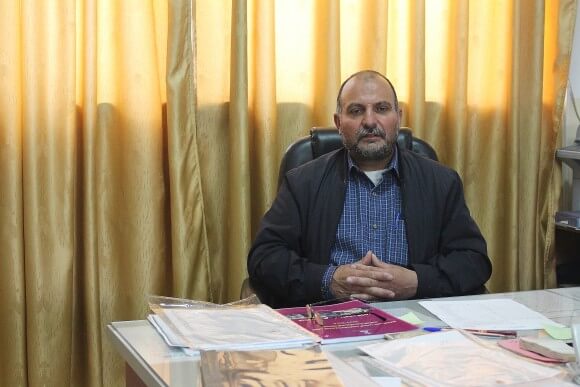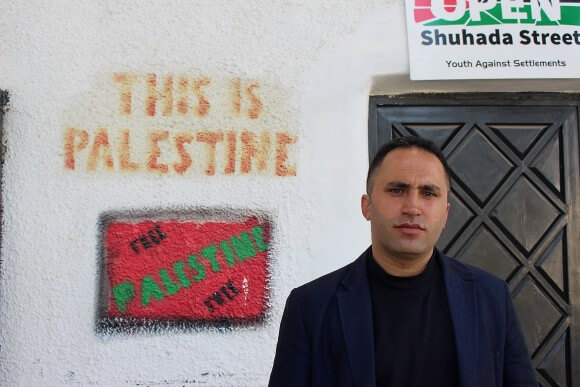Hebron, occupied West Bank – Mustafa Shahen barks orders as young men shrouded in keffiyehs dart across the road. Seventy meters ahead, Israeli soldiers move into position. “Leave from here,” Shahen shouts to a boy around ten years old.
The protests in Hebron are not what they used to be a few weeks ago. They’ve grown in frequency and in danger, and Shahen knows they are not a place for kids.
“There’s a sniper in that building,” Shahen says pointing towards a half built building in downtown Hebron. Behind the building sits a checkpoint into the H2 area, an area exclusively controlled by the Israeli Army and where five hundred illegal Israeli settlers reside, alongside the native Palestinian population that has, so far, resisted attempts at forcing them out.
“Everything feels different from a few weeks ago,” Shahen continues. “We’re angry, they make it impossible to live, and now we have martyrs every day in Hebron. They want to kill us.” As he talks Israeli soldiers move forward slightly, before firing off two shots in quick succession as young men continue to throw stones and run between roads. “You see, live fire.”
At the Hebron Governmental Hospital around half a kilometer away, wounds from Israeli army fire come in with regularity. Being shot in the knee with live ammunition seems to be the preferred method of crowd control.
The escalation in violence in Israel and the occupied Palestinian territories in October saw 70 Palestinians, 11 Israelis, and an Eritrean asylum seeker killed that month (the Eritrean after being mistaken for a Palestinian). That escalation has continued into November.
Around a third of those Palestinian deaths came from Hebron and the surrounding area. The city itself, which has always had a heavy Israeli army presence, is now seeing increased soldier numbers. The subsequent clashes from this, and recent deaths, have had an adverse affect on the city’s population. Doctors Without Borders (MFS) have quintupled their mental health program since the beginning of October in order to cope with the psychological toll recent events have had on the city’s population.
“This city has settlers inside it, and it is surrounded by settlements, it’s a unique situation, while the Israeli military forces are everywhere,” Salam Muharam, a field officer with MFS in Hebron, told Mondoweiss. “This is exposing Palestinians here to many attacks. In some areas, for example around the settlement of Kiryat Arba, we know that people are being attacked by settlers every night now, it’s the same with Shuhada Street.”
The effects of these attacks is that some residents are scared to leave their homes, while MFS have reported that exposure to violence on the streets, and news reports of almost daily killings of Palestinians in Hebron by Israeli soldiers, has taken a dramatic toll on the children of the city. Bedwetting, nightmares, and anxiety as well as increased signs of anger and isolation have been noticed in many children by MFS staff.
“We’ve had to deal with trauma in children, who are being affected a lot by this,’” MFS Mental Health Activities Manager, Natalia Garcia told me. “We are restricted from going to certain areas so I can’t give you the full picture of what’s going on, but schools are now having to carry out psychological first aid for their students.”
The escalation in Hebron has even affected schools directly, with some schools reporting raids on their premises by soldiers in an attempt to detain stone-throwers, while others have reported students being taken to hospital for tear gas inhalation as the Israeli Army fires gas in and around school buildings.
Rawhey Shukrie, headmaster at Tariq Bin Zyad School in Hebron, told me that the school itself has had to treat students over the past few weeks because of tear gas inhalation.

“They shoot tens of tear gas bombs,” Shukrie said. “Every day the Israeli army is doing this now. Every day I stand opposite where the army is standing, where they shoot the gas, to try and prevent it. All of this affects us, the students, their learning, our teaching.”
Because of recent events at schools, as well as fear for the safety of their children on the streets of Hebron, Garcia said that some parents are now not sending their children to school.
Residents of all ages are now changing their routines, taking different routes home, and in some cases, trying not to leave the house. Fear of being killed by a soldier, or targeted by armed Israeli settlers who roam the Israeli controlled H2 area, at times targeting Palestinians, who live side-by-side with them, has gripped Hebron.
In the H2 area of the old city, where around 500 illegal settlers reside in four settlements protected by thousands of Israeli soldiers, attacks against Palestinians have become commonplace. Several Palestinians have also been shot and killed in the area over the last month. Israeli soldiers claim self-defense from potential stabbing attacks for the shootings, while local Palestinians believe that in some cases Palestinians are being shot with little evidence to prove they were any threat at all.
Issa Amro, director of the anti-settlement organization Youth Against Settlements, and a well-known Palestinian peace activist, lives in the H2 area, and recently witnessed a Palestinian being shot and killed by Israeli soldiers in the area.
“A Palestinian man was walking down the stairs near the school here,” Amro said. “The settlers shouted, ‘he has a knife, he has a knife,’ then the soldiers shot him.”
Amro says he didn’t see a knife on the man, but he believes he posed no threat to either settlers or soldiers. “But they don’t distinguish between medical crews, journalists, civilians, or someone who is carrying a knife or not carrying a knife,” Amro continued. “They see all of us as an enemy.”
Now Amro says people are struggling to sleep in the city. Anger and grief are growing in the streets with every Palestinian death, while anxiety and fear over safety has grown exponentially.
“I lived through the Second Intifada,” Amro told me. “I lived in a neighborhood with a lot of Palestinian gunmen, but I never felt like I would be attacked or shot by the Israeli army, I wasn’t worried about it. Now, right now, I am worried about that. Now I’m afraid of being killed.”
Matthew Vickery @MMVickery



Maybe one of the historians who comments here can answer this–where are we now? Around 1939?
Israeli troops raided the offices of an activist group that monitors human rights violations by Israeli military forces and Jewish settlers, and took over homes in neighbouring districts, a rights group and residents told Al Jazeera.
“The area is besieged,” Issa Amro, coordinator of
Youth Against Settlements in the Old City of Hebron, told Al Jazeera by telephone on Saturday.
Amro said dozens of Israeli settlers gathered outside the building, celebrating the raid and chanting for Israeli troops to kill the Palestinians.
“They are rejoicing that they took over my home and building,” he said.
“One of the soldiers said that they were [raiding the home] as punishment for speaking to the international media about what’s happening in Hebron
http://www.aljazeera.com/news/2015/11/israeli-forces-settlers-besiege-hebron-151107143253431.html
Not that it will change reality, but at the very least you all could stop collaborating with the Zionist campaign to erase the memory of places and stop calling the goddam place “Hebron”! It’s El Khalil (or any transciption thereof.) At least a minimum of respect.